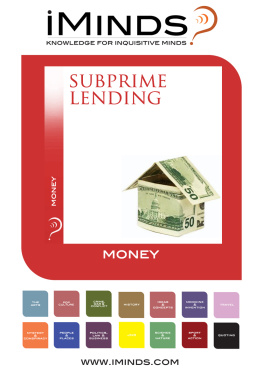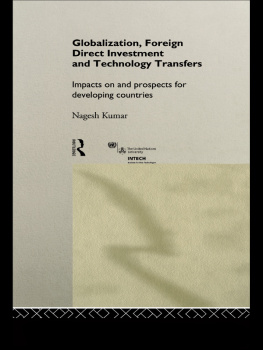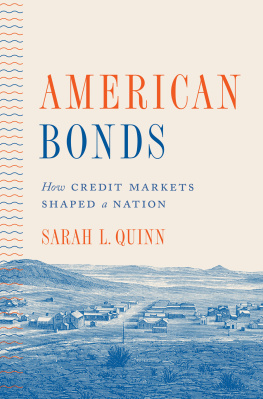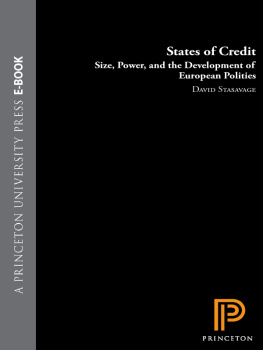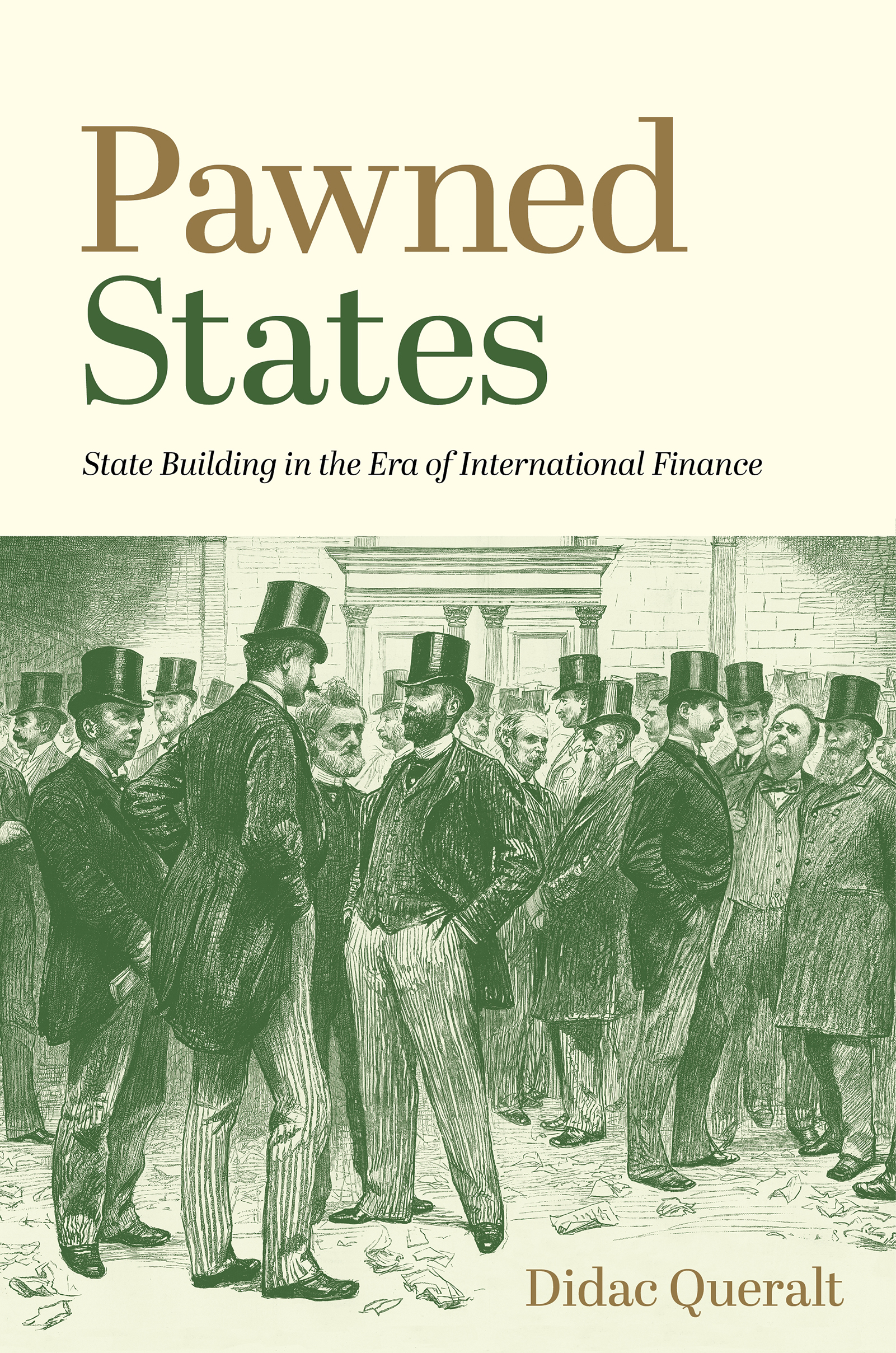PAWNED STATES
The Princeton Economic History of the Western World
Joel Mokyr, Series Editor
A list of titles in this series appears in the back of the book.
Pawned States
State Building in the Era of International Finance
Didac Queralt
PRINCETON UNIVERSITY PRESS
PRINCETON AND OXFORD
Copyright 2022 by Princeton University Press
Princeton University Press is committed to the protection of copyright and the intellectual property our authors entrust to us. Copyright promotes the progress and integrity of knowledge. Thank you for supporting free speech and the global exchange of ideas by purchasing an authorized edition of this book. If you wish to reproduce or distribute any part of it in any form, please obtain permission.
Requests for permission to reproduce material from this work
should be sent to
Published by Princeton University Press
41 William Street, Princeton, New Jersey 08540
99 Banbury Road, Oxford OX2 6JX
press.princeton.edu
Library of Congress Control Number: 2022932411
All Rights Reserved
ISBN 9780691231426
ISBN (pbk.) 9780691231525
ISBN (e-book) 9780691231518
Version 1.0
British Library Cataloging-in-Publication Data is available
Editorial: Bridget Flannery-McCoy and Alena Chekanov
Jacket/Cover Design: Lauren Smith
Production: Erin Suydam
Publicity: Kate Hensley and Charlotte Coyne
Copyeditor: Jennifer McClain
Cover image: The London Stock ExchangeWell-Known Faces in the Consol Market, 1891, print. Lordprice Collection / Alamy Stock Photo
CONTENTS
- vii
- ix
- xi
- 1
- 29
- 57
- 59
- 86
- 129
- 161
- 163
- 195
- 225
- 249
- 290
- 303
- 333
FIGURES
.Nominal Interest Rates in the Bond Era: European vs. Non-European Countries
.State Fragility and Fiscal Capacity
.Fiscal Shocks and State Building Trajectories
.Article 14 of the 1872 Loan to Costa Rica
.Net Capital Exports as Percentage of British GDP, 1816-1913
.Government Loans by Region from 1865 to 1914
.Share of Countries in Default from 1800 to 1913
.Nominal Interest Rates before and after 1800
.Comparison of Nominal Interest Rates Excluding British Dependencies
.Primary and Secondary Bond Markets Compared, 1880-1913
.Average Yield at Issue by Region, 1816-1913
.Test of Existing Explanations of the Bond Spread: Reputation, the Gold Standard, and the Empire Effect
.Example 1: Pledge in the 1870 Romanian Bond
.Example 2: Pledges in the 1897 Dominican Bond
.Example 3: Pledges in the 1910 Chinese Bond
.Effect of Pledges on Bond Yield over Time
.External Debt vs. Tax Revenue in the Ottoman Empire
.Revenue from Ceded Taxes vs. Locally Collected Revenue in the Ottoman Empire
.Tax Revenue and External Debt in the Ottoman Empire
.Budget Balance before and after Financial Control in the Ottoman Empire
.War outside Western Europe from 1816 to 2001
.Geography of Warfare in the Long Nineteenth Century
.Marginal Effect of War on External Capital Inflows
.South African Provinces until 1976
.Fiscal Performance in the Cape and the Transvaal in the Second Boer War
.Effect of War on Direct Taxation as a Function of Default Episodes
.British Capital Exports from 1865 to 1914
.Effect of War on Direct Taxation as a Function of Exogenous Access to External Capital
.Long-Run Fiscal Capacity as a Function of War and Endogenous Credit Access
.Long-Run Fiscal Capacity as a Function of War and Exogenous Credit Access
.Long-Run Fiscal Capacity as a Function of Exogenous Credit Access and Ongoing War plus Initial State Capacity Controls
.Long-Run Fiscal Capacity as a Function of Exogenous Credit Access and Correlates of War Data, Subsetting for Noninitiators and Controlling for War Outcomes
.Effect of Past Warfare and Exogenous Credit Access on Fiscal Capacity from 1945 to 1995
.Effect of War Finance on Executive Constraints in the Short (1900-1913) and Long Run (1995-2005)
.War and Activation of the Political Mechanism
.Current and Historical Correlates of Tax Administration and War Finance
.Effect of War Finance on the Size and Wage Premium of the Finance Administration in the Late 1970s and Early 1980s
.Foreign Public Debt as Percentage of Total Public Debt in Japan
.Public Debt in Japan and Argentina before 1914
.Tax Revenue in Chile in the Long Nineteenth Century
.War Financing in Chile as a Function of External Capital Access
.Tax Personnel in Chile from 1845 to 1915
.Share of Nontrade Tax to Total Tax Revenue in Chile
TABLES
.External Capital Stock by Country in the Long Nineteenth Century
.Descriptive Statistics of Sovereign Bonds, 1816-1913
.Bond Yield and Pledging, 1858-1914
.Pledging and the Empire Effect
.Bivariate Relationship between Pledges and Yield at Issue
.Sinking Funds and Yield at Issue
.The Ottoman Empire (O.E.) at War
.Funding of the Central Treasury in the Ottoman Empire
.Large Military Conflicts by Region since 1400
.Explicit War and Military Loans
.War and External Capital Inflows from 1865 to 1913
.Sample Coverage of Direct Tax Ratios Prior to 1914
.Banking Crises and Stock Market Crashes in London, 1816-1913
.Frequency and Duration of War as a Function of Endogenous and Exogenous Credit Access in the Short-Run Test Sample
.Effects of War and External Capital Access on Short-Term Fiscal Capacity
.Frequency and Duration of War as a Function of Exogenous Credit Access in the Long-Run Test Sample
.Models of Personal Income Tax as Percentage of GDP circa 2000 in the Global Periphery as a Function of War and Exogenous Credit Access in the Long Nineteenth Century
.Scope Conditions for the Activation of the Political Mechanism of Persistence
.Effect of Past Warfare and External Capital Access on State Capacity on the Eve of World War I
ACKNOWLEDGMENTS
This book has benefited from multiple conversations and discussions with colleagues and friends. I am particularly grateful to Carles Boix, Alex Debs, Isabela Mares, Adam Przeworski, Ken Scheve, and David Stasavage for their unrelenting support and valuable suggestions. Detailed comments by Pablo Beramendi, Lisa Blaydes, Jeff Frieden, Mara Jos Hierro, Nuno Monteiro, Layna Mosley, John Roemer, Shanker Satyanath, and Andreas Wimmer also contributed to key aspects of the argument.
The project marinated in conversationssome more formal than otherswith Francesc Amat, Ben Ansell, Laia Balcells, Thomas Brambor, Christian Breunig, Lawrence Broz, Allan Dafoe, Ruben Enikolopov, Rui Esteves, Marc Flandreau, Hector Galindo-Silva, Aina Gallego, Francisco Garfas, Scott Gates, Mitu Gulati, Margaret Levi, Johannes Lindvall, Debin Ma, Kris James Mitchener, Jordi Muoz, Pilar Nogues-Marco, Maria Petrova, Giacomo Ponzetto, Leandro Prados de la Escosura, Peter Rosendorff, Pacho Snchez-Cuenca, Peter Schram, Erik Voeten, Hans-Joachim Voth, Mark Weidemaier, Tianyang Xi, and Noam Yuchtman. I thank all of them, as well as workshop participants at the Barcelona Institute of Economics, Columbia University, Duke University, the European University Institute, the Global Research in International Political Economy webinar, the London School of Economics (LSE), Lund University, New York University (NYU), NYUAbu Dhabi, Peking University, Sciences Po, Stanford University, University Carlos III of Madrid, University College London, the University of Manchester, the University of Notre Dame, Vanderbilt University, and Yale University, and annual meetings organized by the American Political Science Association, the European Political Science Association, the International Political Economy Society, and the International Studies Association.


